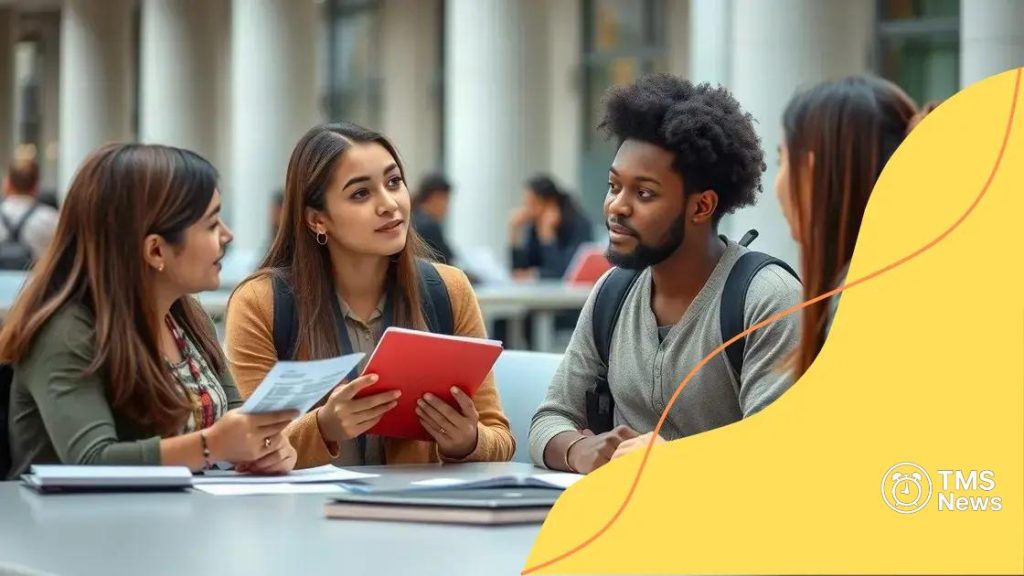International student visa revocations: what you should know

Anúncios
International student visa revocations can occur due to reasons such as non-compliance with visa conditions, dropping classes, or providing false information, making it essential for students to stay informed and proactive to avoid issues.
International student visa revocations can be a stressful experience for many students abroad. What should you do if this happens to you? This article delves into the causes and solutions surrounding this issue.
Anúncios
Understanding visa revocations for international students
Understanding the visa revocations for international students is crucial for anyone studying abroad. It can be confusing and alarming, yet knowing the facts can help you manage this situation effectively.
There are several reasons that your visa might be revoked. Being aware of these factors can potentially prevent issues down the line. Let’s explore some of the most common reasons.
Common reasons for visa revocation
Firstly, one of the leading causes is failing to maintain your student status. This can happen if you drop classes or do not enroll full-time. It’s essential to always keep track of your academic performance and course load.
Anúncios
- Non-compliance with visa conditions
- Involvement in criminal activities
- Providing false information during the application process
Secondly, visa authorities regularly review student records. If there is a discrepancy, this could trigger a revocation process. Ensure that your records are accurate and up-to-date.
Another important aspect is the need to follow all regulations set by your institution and the immigration authority. If you work more hours than allowed or fail to report any changes in your situation, this could lead to serious consequences.
Preventing visa revocation
To avoid visa revocation, it is vital to be proactive. Here are some steps you can take:
- Regularly check in with your school’s international office.
- Keep all documents organized and accessible.
- Be aware of your rights and responsibilities as an international student.
Lastly, always stay informed about any changes in immigration laws. Understanding these changes can provide an extra layer of security against possible revocations.
Common reasons for visa revocations
There are various reasons why international students may face visa revocations, and understanding these can help prevent issues before they arise. By being aware of the common pitfalls, students can take steps to ensure compliance.
One prevalent reason is failing to maintain full-time enrollment. If you drop classes without proper guidance, your visa could be at risk.
Key factors leading to revocations
Additionally, staying compliant means being aware of your rights and responsibilities. Violating visa conditions, even inadvertently, can lead to revocation. Here are some key points to keep in mind:
- Not adhering to the terms of your visa, such as working too many hours.
- Submitting false information during the application process, which can jeopardize your immigration status.
- Involvement in illegal activities, which is strictly against visa regulations.
Another reason for revocation is if your school reports a change in your enrollment status. If you are suspended or expelled, your visa can be terminated promptly. It’s essential to maintain good academic standing at all times.
Keeping your documents updated is also critical. Missing deadlines for document renewals or failing to report changes, such as a new address or school transfer, can lead to complications with your visa status.
Awareness is crucial
Being aware of these factors is key to avoiding visa revocations. Regularly checking your compliance with the regulations set forth by your institution and immigration authorities can save you from unnecessary stress.
Consult with your school’s international office frequently. They can provide guidance to ensure you remain in good standing and avoid any issues.
How to appeal a visa revocation decision

If you find yourself in a situation where your visa has been revoked, understanding how to appeal that decision is crucial. The appeal process can seem overwhelming, but knowing the steps can make it manageable.
First, carefully go through the revocation notice. This document will outline the reasons for the revocation and provide important details about the next steps. Make sure you have a clear understanding of what led to your visa being revoked.
Steps to appeal
The first step in appealing is to gather evidence to support your case. This could include:
- Documents that prove your compliance with visa requirements.
- Correspondence with your school regarding your status.
- Any other relevant information that supports your case.
Once you have your documents, you can submit your appeal to the relevant immigration authority. Ensure that you follow all instructions clearly and provide all necessary documentation. It’s important to do this as soon as possible, as there may be deadlines for submitting appeals.
Seeking legal advice
Consider consulting with an immigration lawyer. They can provide guidance tailored to your specific situation. Having professional help can improve your chances of a successful appeal.
After your appeal is submitted, be prepared for the waiting period. This can vary significantly based on the immigration authority’s processes. Keep in mind that during this time, it’s essential to maintain communication with your school and stay informed about your visa status.
Remember, while the appeal process can be stressful, staying organized and proactive will help you navigate it successfully. Keeping records of all communications and documentation is vital in helping your case.
Tips to avoid visa issues
Maintaining your visa status as an international student requires diligence and attention to detail. By following certain tips, you can avoid potential issues that may arise during your studies abroad.
First, always stay informed about your visa conditions. Understanding what is allowed and what is not can prevent misunderstandings. Regularly check in with your school’s international office to ensure you are on track.
Essential tips to prevent visa problems
It’s also essential to keep all your documents organized. Here are some essential tips for maintaining good standing:
- Regularly maintain your academic status by enrolling in the required number of credits.
- Set reminders for visa renewal deadlines to avoid lapse in your visa status.
- Keep your personal information updated with the immigration authorities and your school.
Another critical point is to avoid working more hours than your visa permits. Many student visas have strict rules regarding employment, and exceeding those limits can lead to serious consequences.
Furthermore, learn about and adhere to any reporting requirements. If there are changes in your enrollment status or personal circumstances, report them immediately. This can include address changes or changes to your financial situation.
Stay proactive
Staying proactive is crucial in preventing visa issues. Attend any workshops or information sessions provided by your institution. These sessions can help you understand any new regulations that affect you.
Engage with other international students to share experiences and tips. They might have valuable insights into navigating challenges that arise.
Resources for affected international students
If you are an international student facing challenges, knowing the available resources can make a big difference. Many organizations, schools, and online platforms offer support to help you navigate tough situations.
Your first resource should be your school’s international office. They are equipped to provide guidance tailored specifically to international students. They can help with issues like visa concerns, academic support, and even personal challenges.
Helpful resources
In addition to your school’s international office, consider these additional resources:
- Legal aid organizations: These can provide legal advice regarding visa issues and rights as an international student.
- Student associations: Many campuses have associations dedicated to international students. They often host events and create networks that can help.
- Online forums: Websites like Reddit and specific Facebook groups can offer community support and shared experiences.
Furthermore, local community centers in your area may offer support services, including counseling and workshops to help you adjust to life in a new country.
Another valuable resource is your academic advisor. They can help ensure you are on track with your studies and provide information on academic resources available for students.
Staying informed
It is important to stay informed about changes in immigration laws and regulations that could affect your status. Websites of reputable immigration organizations can provide timely updates. Subscribing to newsletters from these organizations is an effective way to keep yourself updated.
Remember, you do not have to face challenges alone. Utilizing all the resources available can greatly ease your experience as an international student.
In conclusion, navigating the world of international student visas can be challenging, but it is essential to stay informed and proactive. By knowing the common reasons for visa revocations and how to appeal decisions, you can better prepare yourself for potential issues. Utilizing available resources and support networks can also provide the help you need during difficult times. Remember to keep track of your visa status and adhere to all regulations to ensure a smooth experience while studying abroad.
FAQ – Frequently Asked Questions about International Student Visa Revocations
What should I do if my visa is revoked?
If your visa is revoked, carefully review the revocation notice and gather evidence to support your appeal. Contact your school’s international office for guidance.
How can I prevent visa revocation?
To prevent visa revocation, maintain full-time enrollment, keep your documents updated, and comply with all visa regulations.
What resources are available for international students?
Resources include your school’s international office, legal aid organizations, student associations, and online forums for community support.
Is legal assistance necessary for appealing a visa decision?
While not mandatory, consulting with an immigration lawyer can provide valuable insights and improve your chances of a successful appeal.





